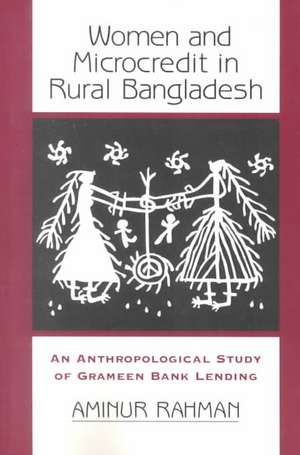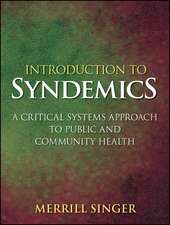Women And Microcredit In Rural Bangladesh: An Anthropological Study Of Grameen Bank Lending
Autor Aminur Rahmanen Limba Engleză Paperback – 14 mar 2001
| Toate formatele și edițiile | Preț | Express |
|---|---|---|
| Paperback (1) | 410.46 lei 43-57 zile | |
| Taylor & Francis – 14 mar 2001 | 410.46 lei 43-57 zile | |
| Hardback (1) | 998.83 lei 43-57 zile | |
| Taylor & Francis – 19 aug 2019 | 998.83 lei 43-57 zile |
Preț: 410.46 lei
Nou
Puncte Express: 616
Preț estimativ în valută:
78.54€ • 82.22$ • 64.99£
78.54€ • 82.22$ • 64.99£
Carte tipărită la comandă
Livrare economică 07-21 aprilie
Preluare comenzi: 021 569.72.76
Specificații
ISBN-13: 9780813339306
ISBN-10: 0813339308
Pagini: 204
Dimensiuni: 152 x 229 x 13 mm
Greutate: 0.32 kg
Ediția:Revised
Editura: Taylor & Francis
Colecția Routledge
Locul publicării:Oxford, United Kingdom
ISBN-10: 0813339308
Pagini: 204
Dimensiuni: 152 x 229 x 13 mm
Greutate: 0.32 kg
Ediția:Revised
Editura: Taylor & Francis
Colecția Routledge
Locul publicării:Oxford, United Kingdom
Notă biografică
Aminur Rahman was born and raised in Bangladesh. He has a Master's Degree in Sociology (University of Dhaka, Bangladesh), M.Phil in Social Anthropology (University of Oslo, Norway), and Ph.D. in Anthropology (University of Manitoba, Canada). Before going abroad for higher studies, Rahman worked for several years with national and international NGOs in Bangladesh in community development projects. He also taught at the University of Manitoba and has published in many international journals, including World Development. Rahman is currently working with the Small Enterprise Program of the International Development Research Centre (IDRC) in Ottawa, Canada.
Cuprins
* List of Figures * Preface * Acknowledgments * 1. Introduction * Statement of the Problem * The Grameen Bank * The Lending Structure of the Grameen Bank * Studies of the Grameen Bank * Microcredit in Development Projects * Women in Development and Incorporation of Microcredit * Women in Development: A Bangladesh Context * The Significance of This Study * The Structure of the Book * 2. Field Research Methodology * Pre-Fieldwork Research Plan * Initiation of Field Research * The Native as Researcher, and Rapport Building * Data Collection * Research Ethics * Limitations of the Research * 3. Theoretical Framework * Entitlement, Enfranchisement, and Empowerment * Public and Hidden Transcripts * Practice Theory * The Concept of Hegemony * 4. The Study Village and Its Socioeconomic Organization * The Location * Social Organization * The Village Population and Its Literacy and Education Level * Economic Organization * Grameen Households in the Local Economy * Migration in the Village Economy * Women and the Village Economy * 5. Microlending and Equitable Development * The Public and Hidden Transcripts for Recruiting Women * Patriarchal Hegemony in the Recruitment of Women Borrowers * Organization of the Women and Social Collateral * Networks of Borrowers and Bank Workers * The Social Development Initiatives of the Bank * 6. Disbursement and Recovery of Loans: Bases for Escalation of Violence? * Loans in the Study Village * Processing of Loan Applications * Loan Disbursement * Loan Use and Loan Supervision * Loan Repayment Schedule * Escalation of Aggression and Violence * 7. Microlending and Sustainable Development * Sustainability and Profitability * The Grameen Bank and Capitalism * Transaction Costs, Outreach, and Sustainability * Consequences of High Loan Disbursement and Loan Recovery * Spiraling Debt Cycle * The Donor Perspective * Conclusion * Review of the Study * Theoretical Implications * Policy Recommendations * Appendix A: Glossary of Non-English Words * Appendix B: The Sixteen Decisions * Appendix C: Grameen Bank Bidhimala (Bye-laws/Constitution) * References
Descriere
The Grameen Bank of Bangladesh has been extending small loans to poor borrowers (primarily women) to promote self-employment and income generation since 1976














